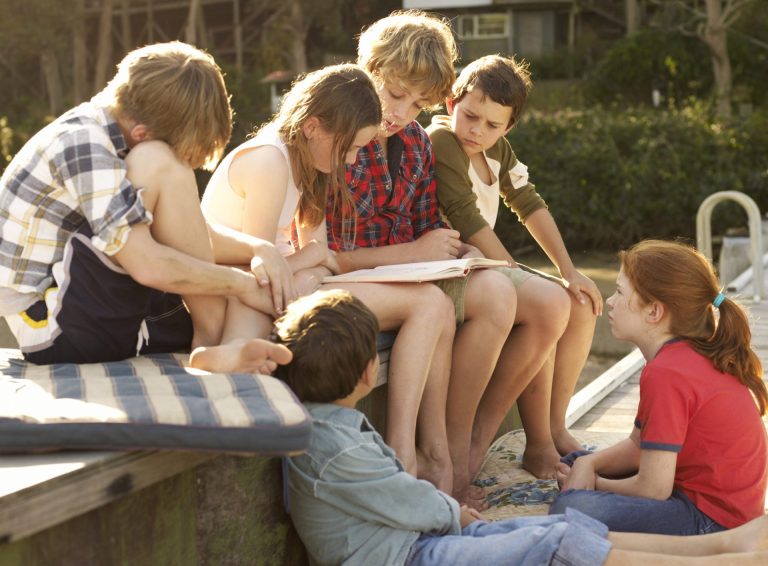Sending your kid off to sleepaway camp can stir up a mix of excitement and anxiety. For parents, the thought of letting go—whether it’s their first time or their fifth—can come with a whirlwind of emotions. You may be wondering if they’ll make friends, eat enough or too much junk, or remember to put on sunscreen. But with some prep work, you can ensure your child has an unforgettable experience while you manage those mama bear nerves.
Here’s how you can make getting ready for camp fun, stress-free, and—dare we say—enjoyable? Preparing your kids for sleepaway camp is all about communication – from a deep discussion about the camp’s social dynamics to their health considerations. There is a lot of fun stuff, too, from packing essentials to organization (hello, kids’ name labels)
What to Talk to Your Child About Before Camp
Sending your child to camp isn’t just about packing the right gear—it’s also about preparing them mentally and emotionally. A few meaningful conversations beforehand can set the stage for a positive and empowering experience. Like we said, communication is the best tool for preparing your kids for sleepaway camp!
1. Setting Expectations for Camp Life
Camp is a unique environment with its own set of rules and routines. Helping your child understand what to expect will ease any anxiety they might have. Discuss everything from cabin arrangements to meal times to what a typical day might look like.
- Daily Schedule: Explain the general schedule at camp. Will they be waking up early for hikes? What’s lunchtime like? Giving them an idea of what their days will look like helps them feel mentally prepared.
- Activities and Fun: Encourage them to try new things! From arts and crafts to canoeing, let them know that camp is about experiencing new adventures and making lifelong memories.
Example: “I know you’re a little nervous about the horseback riding class, but think of it as a fun challenge. Even if you’ve never ridden before, you’ll get the hang of it!”
2. Addressing Homesickness and Separation Anxiety at Sleepaway Camp
Homesickness is completely normal, and even seasoned campers can experience it. Let your child know that feeling a little sad or nervous is okay, and reassure them that those feelings usually pass as they settle in and make new friends.
- Feelings are OK: Let them know it’s okay to miss home, and that lots of campers feel the same way. Reassure them that they can always talk to a camp counselor if they need extra support.
- Coping Mechanisms: Encourage your child to bring a comfort item, like a favorite stuffed animal, or even a small note from you to help them feel more secure.
Learn more about coping with homesickness here.
3. Social Skills & Navigating Friendships
One of the biggest parts of camp is socializing. For some kids, this comes naturally, while others may feel shy or unsure about making friends. Give your child some conversation starters and remind them that everyone is in the same boat.
- Making Friends: Help your child understand how to approach new campers and what it means to be a good friend.
- Conflict Resolution: Sometimes, things won’t go smoothly. Discuss how to resolve conflicts calmly, and that it’s okay to ask a counselor for help if they need assistance.

Bullying and Social Challenges: What Your Child Needs to Know
Unfortunately, bullying can happen anywhere—even at summer camp. While most camps work hard to create a safe and inclusive environment, it’s important to prepare your child for any social challenges they might face. Having an open and honest conversation before they leave can help them feel more confident in handling tricky situations.
1. Understanding What Bullying Looks Like
Bullying isn’t just physical—it can also be verbal or emotional. Teach your child to recognize different forms of bullying, including:
- Exclusion: Being deliberately left out of group activities.
- Teasing or Name-Calling: Persistent, mean-spirited jokes at their expense.
- Intimidation: Feeling pressured or scared to do something they don’t want to do.
Teach Your Kids How to Respond to Bullying:
Give your child tools to handle difficult social situations. Let them know that standing up for themselves (or others) is important, and they should always feel safe speaking to an adult.
- Use Words First: Encourage them to say, “Please stop, I don’t like that.” Many bullies back down when confronted directly.
- Walk Away: If someone is being unkind, teach your child to remove themselves from the situation and find a counselor or friend.
- Tell an Adult: Emphasize that asking for help is not tattling—it’s making sure that everyone stays safe.
Find expert tips on addressing bullying.
What You Need to Do Before Sending Your Child to Sleepaway Camp
Preparation is the key to a successful camp experience—for both you and your child. Taking the time to go over expectations, organize gear, and have some important discussions can make the transition smoother. Think of it as setting your child up for success while giving yourself peace of mind.
1. Packing Doesn’t Have to Be a Chore: Make it Fun!
Packing for camp is an essential part of the process, and getting your child involved can make it an exciting experience rather than a tedious one. Let them help select their favorite outfits, choose a special comfort item, and organize their bag so they know exactly where everything is. When they have a hand in packing, they’ll feel more confident when they arrive at camp.
- Clothing: Pack clothes for all types of weather—sun, rain, and cooler nights. Be sure to include extra socks and underwear. Don’t forget the camp-approved swimsuit!
- Sleeping Gear: A cozy sleeping bag, a soft pillow, and comfort items (like a favorite stuffed animal or blanket) will make their camp bed feel just a little more like home.
- Personal Items: Toothbrush, toothpaste, sunscreen, bug spray—basics, right? But don’t forget to label each item with sleepaway camp name labels to avoid any mix-ups (especially with allergies) and unwanted germs.
- Activity Gear: Depending on the camp’s activities, they might need hiking boots, rain gear, or a water bottle. Make sure to label them too!
- Medication & Health Needs: If your child needs medication, pack enough for the entire camp session and include clear instructions for the camp staff.
Key Takeaways: How to Prepare Your Child for Sleepaway Camp
- Involve your child in packing: Make it fun, and don’t forget those kids name labels!
- Talk about expectations: Go over the camp schedule, activities, and possible homesickness.
- Discuss social skills and conflict resolution: Teach your child how to make friends and handle tough situations.
- Address bullying: Make sure your child knows how to stand up for themselves and others.
- Talk to the camp staff: Ensure the camp is equipped to handle your child’s needs and special circumstances.
- Encourage questions: Let your child voice their concerns, and help them feel prepared.


